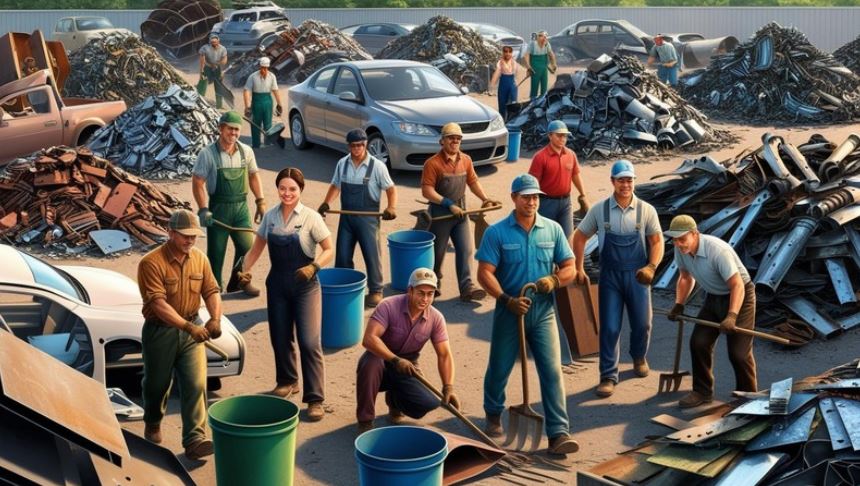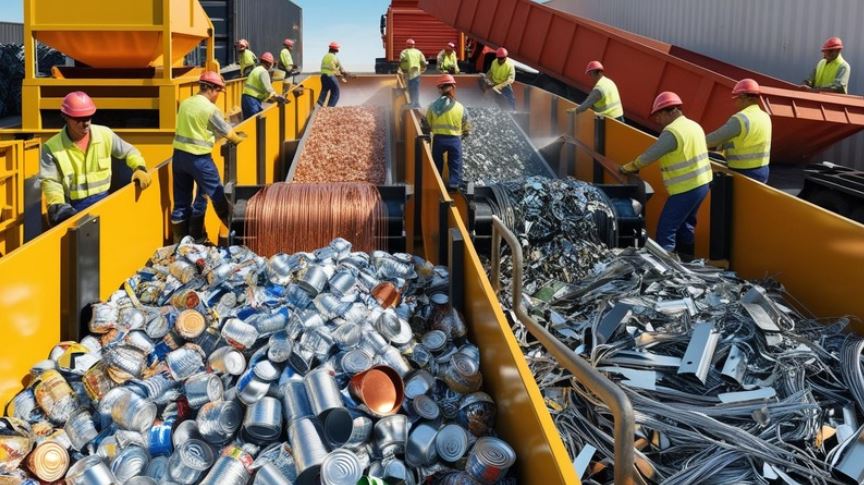
In recent years, the scrap metal industry has become a significant part of the global economy. From recycling old cars and machinery to processing metals for reuse, scrap dealers play an essential role in reducing waste and promoting sustainability. However, with the rise in metal theft and illegal practices, the industry has faced increased scrutiny. This is where the Scrap Metal Dealers Act 2013 comes into play, ensuring that businesses in the sector operate transparently, ethically, and in compliance with the law.
Understanding the Scrap Metal Dealers Act 2013
The Scrap Metal Dealers Act 2013 was introduced by the UK government to regulate the scrap metal industry and tackle the growing problem of metal theft. The Act provides clear guidelines for businesses and individuals involved in scrap metal trading, establishing a system of licensing and compliance checks.
According to the Act, anyone who wishes to carry on business as a scrap metal dealer must hold a valid licence. The legislation clearly outlines the requirements for obtaining a licence, the conditions for operating legally, and the penalties for failing to comply.
Who is the “Scrap Man”?
The term “scrap man” commonly refers to individuals or businesses engaged in the collection, recycling, or resale of scrap metal. This could be anyone from a small business owner with a single vehicle collecting metal from various sites, to a large company managing multiple sites with a broad range of scrap metal processing operations.
As the industry has evolved, it is increasingly important for the “scrap man” to be aware of the regulations surrounding the business. The Scrap Metal Dealers Act 2013 ensures that those involved in the industry are licensed, operate transparently, and adhere to the highest standards of business conduct.
Our Compliance with the Act
Compliance with the Scrap Metal Dealers Act 2013 is not just a legal obligation; it’s also a way to build trust with customers, authorities, and the community. Here’s how we ensure compliance:
1. Obtaining the Correct Licence
The first step in ensuring compliance is ensuring that we hold the correct licence. Under the Act, we must apply for a site licence or a collector’s licence, depending on the nature of our business.
- Site Licence: For scrap metal dealers operating at specific locations.
- Collector’s Licence: For those engaged in mobile scrap metal collection.
Before obtaining a licence, local authorities assess our business operations and check for any criminal history or relevant past offences. If we meet all the necessary criteria, the licence is issued.
2. Verifying the Identity of Suppliers
One of the core requirements of the Scrap Metal Dealers Act 2013 is the verification of the identity of all individuals who sell us scrap metal. We must ensure that we know the full name and address of the seller before accepting any scrap metal. This verification must be done by consulting reliable and independent sources, such as government-issued IDs or utility bills. Failure to comply with this requirement can lead to fines and penalties.
3. Payment for Scrap Metal
The Act also prohibits scrap dealers from paying for scrap metal in cash. Instead, we are required to pay via cheque or electronic transfer (such as credit or debit cards). This restriction is designed to discourage illegal transactions and reduce the incentive for criminals to steal scrap metal for cash. As a compliant scrap metal dealer, we adhere strictly to this rule to avoid legal consequences.
4. Displaying Our Licence
As part of the compliance process, we display a copy of our scrap metal licence prominently at every site we operate. If we are working as a mobile collector, we ensure the licence is visible on the vehicle. This transparency is essential for ensuring that customers, regulators, and the public can verify that we are operating legally.
5. Regular Updates and Notifications
To maintain compliance, we keep authorities updated with any material changes to our operations. For example, if there’s a change in our trading name, or if we stop conducting business in a particular area, we notify the relevant local authority. This ensures that our records are always accurate and up to date, and helps avoid penalties for non-compliance.
6. Training and Internal Controls
In addition to the legal requirements, we invest in ongoing training and implement internal controls to ensure that all employees involved in scrap metal collection, processing, and sales follow the correct procedures. By fostering a culture of compliance within our organization, we reduce the risk of human error and ensure that we meet the highest ethical standards.
The Benefits of Compliance
Being compliant with the Scrap Metal Dealers Act 2013 provides numerous advantages. First and foremost, it keeps our business legal and prevents fines or penalties. Compliance also helps to protect the environment by ensuring that scrap metal is processed in a responsible and sustainable way. Furthermore, adhering to the law builds trust with our customers and the community, enhancing our reputation as a responsible and ethical business.
The scrap metal industry is an essential part of the economy, but it must be regulated to prevent misuse and criminal activity. The Scrap Metal Dealers Act 2013 offers clear guidelines for businesses in the sector, and compliance is crucial for maintaining a legitimate and successful operation. By ensuring that we adhere to the Act’s requirements — from obtaining the correct licences to verifying the identity of our suppliers and making payments in the right manner — we not only stay on the right side of the law but also contribute to a more ethical, transparent, and responsible scrap metal industry.
For anyone involved in the business, understanding and complying with the Scrap Metal Dealers Act 2013 is not just a legal necessity — it’s a commitment to integrity and sustainability.
FAQ on the Scrap Metal Dealers Act 2013
- What is the Scrap Metal Dealers Act 2013? The Scrap Metal Dealers Act 2013 is a UK law that regulates the scrap metal industry to combat metal theft and ensure scrap metal dealers operate transparently and legally. It sets out licensing requirements, operational rules, and penalties for non-compliance.
- Do I need a licence to operate as a scrap metal dealer? Yes, you must have a valid licence to operate as a scrap metal dealer. Without one, you are breaking the law and can face penalties.
- What are the types of licences available? There are two types of licences:
- Site Licence: For businesses operating at specific locations.
- Collector’s Licence: For mobile scrap metal collectors.
- How do I apply for a licence? To apply, you must contact your local authority. They will assess your suitability to operate as a scrap metal dealer, considering factors such as criminal history and any previous violations.
- What criteria do local authorities use to determine if I am suitable to hold a licence? Local authorities will consider factors such as any criminal convictions, past enforcement actions, previous licence refusals or revocations, and whether you have adequate procedures in place to comply with the Act.
- Can I hold more than one licence? Yes, you can hold more than one licence issued by different local authorities. However, you cannot hold more than one licence issued by the same authority.
- What happens if I operate without a licence? Operating without a licence is illegal. You can be fined up to level 5 on the standard scale for breaching the Act.
- Do I need to verify the identity of people selling scrap metal to me? Yes, you must verify the full name and address of anyone from whom you receive scrap metal. This verification must be done using reliable and independent documents or sources.
- Can I pay for scrap metal in cash? No, the law prohibits paying for scrap metal in cash. Payments must be made by cheque or electronic transfer (e.g., credit or debit card).
- What should I do if I change my business details, like my trading name? If you change your trading name or any other material details, you must notify the local authority within 28 days to ensure your records remain up to date.
- Do I need to display my licence? Yes, if you hold a site licence, you must display a copy of it at each of your business sites. If you hold a collector’s licence, the licence must be displayed on any vehicle used for business purposes.
- What are the consequences if I don’t comply with the Act? Failure to comply with the Scrap Metal Dealers Act 2013 can result in fines, penalties, and even the revocation of your licence. Additionally, if you engage in unlawful practices such as accepting scrap without verifying identities or paying in cash, you can be fined up to level 3 on the standard scale.


